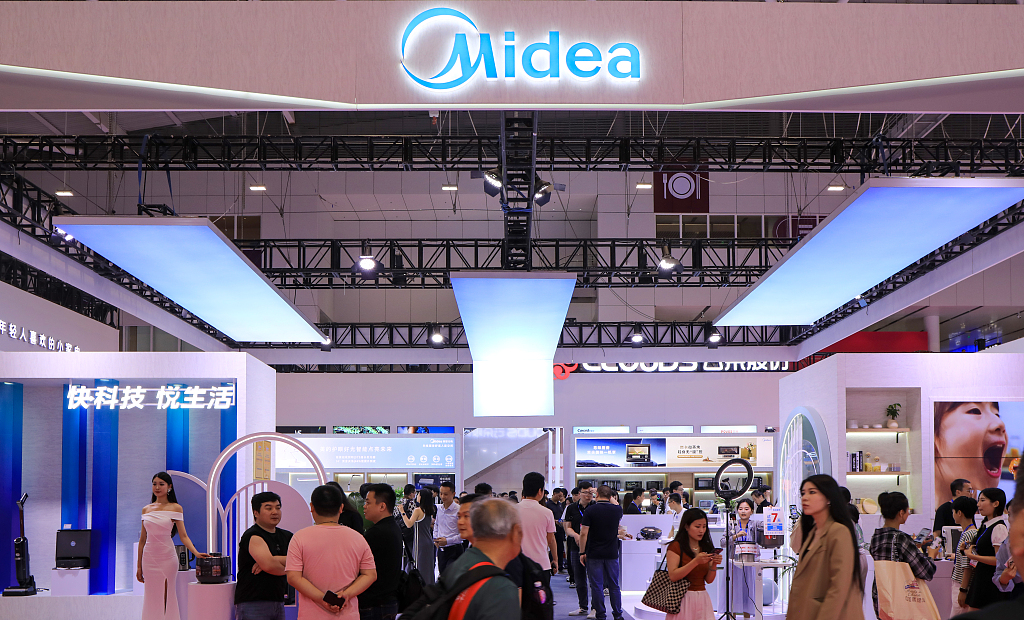
Chinese home appliance maker Midea Group is seeking to raise up to $4 billion in Hong Kong this month in what could be the city’s largest initial public offering in more than three years, according to market sources. But financial analysts warn it may not be enough to revive Hong Kong’s lackluster stock market.
The Shenzhen-listed group plans to open its Hong Kong share offering to investors as early as next week. The fundraising target accounts for about 6 percent of its A-share market capitalization, which now stands at 457.4 billion yuan (64.56 billion).
The Foshan-based company is considering pricing its Hong Kong shares at up to a 20 percent discount on its Shenzhen-listed A-shares, and it will complete the listing before Sept 30, the sources said.
READ MORE: Midea Group expands footprint into Middle East market
Midea’s Shenzhen-traded shares closed at 63.02 yuan on Friday, down 0.9 percent from a day earlier.
The IPO is set to be the largest in Hong Kong in more than three years, since search giant Baidu’s $3.08 billion flotation in March 2021.
According to Bloomberg, cornerstone investors are expected to subscribe to about $1 billion worth of shares in Midea Group’s Hong Kong share offering.
The fundraising comes at a critical juncture for the Hong Kong bourse, which has been grappling with a dearth of liquidity and underwhelming public offerings.
The international financial hub logged HK$13.1 billion in capital raised in the first six months on the Hong Kong Stock Exchange, down 27 percent from the same period a year earlier. Thirty firms were listed in the first half.
Tom Chan Pak-lam, permanent honorary president of the Institute of Securities Dealers, cautioned against expecting a few large listings to reinvigorate the market.
“Hong Kong’s main issue is low liquidity — simply put, there is a lack of investor enthusiasm,” Chan noted.
Gary Ng, senior economist for Asia-Pacific at Natixis CIB, said Midea’s IPO is a good litmus test for Hong Kong’s market sentiment. “It is helpful, but it is too early to say it will bring a complete reversal.”
Industry veterans highlighted the need for broader reforms to address challenges in the Hong Kong fundraising pool.
Ng noted that “Hong Kong will need better macro and investment themes to attract capital back, such as improved corporate profits, more diversified sectors, and companies with good prospects. Access to mainland investors can be a core advantage of Hong Kong. It needs a further upgrade to existing programs, such as an IPO connect.”
Mike Leung Kit-man, responsible officer at Wocom Securities Ltd, highlighted the need for incentives, such as stock tax cuts, to improve market conditions.
Chan agreed with Leung, calling for a reduction or elimination of stamp duty in stock trading to boost market sentiment.
Daily turnover on the Hong Kong bourse fell from HK$166 billion ($21.3 billion) in 2021 to HK$110.4 billion in the first six months of this year — down 33 percent.
READ MORE: Home appliance maker Midea eyeing potential HK listing
Ambrose Lam San-keung, a member of Hong Kong’s Legislative Council, struck an upbeat tone on Hong Kong’s position as an attractive listing venue for Chinese mainland companies despite current market challenges.
“Hong Kong facilitates mutual market access through programs like the stock connects between Hong Kong and the two mainland bourses of Shanghai and Shenzhen,” Lam said.
Cliff Ip, Greater China divisional president of CPA Australia, said Hong Kong stocks’ current average price-to-earnings ratio is at a “very low” level, suggesting it has bottomed out.
Contact the writers at tianyuanzhang@chinadailyhk.com


